| December 29, 2008 |  |
MarsDaily Advertising Kit |
| Previous Issues | Dec 27 | Dec 26 | Dec 23 | Dec 22 |
Mine life may show how Martian life exists Tower, Minn. (UPI) Dec 22, 2008
Tower, Minn. (UPI) Dec 22, 2008 Scientists could learn about Martian water life by plumbing a spring in an iron ore mine in Minnesota's Iron Range, University of Minnesota researchers say. The researchers say microorganisms in the lowest levels of the spring could be a boon for scientists interested in studying possible life on Mars, the St. Paul Pioneer Press reported Monday, because the mine water was held by rock ... more Ferric Oxides And Sulfates In Equatorial Regions Of Mars  Paris, France (SPX) Dec 22, 2008
Paris, France (SPX) Dec 22, 2008Observations made with the OMEGA imaging spectrometer onboard Mars Express reveal very strong signatures of sulfates and ferric oxides in Aram Chaos. Detailed morphological analyses indicate that the concentration of ferric oxides in this region results from the alteration of a sulfate rich sedimentary formation resting on the floor of the crater. These results are reported by M. Masse ... more Rock Varnish: A Promising Habitat For Martian Bacteria  Tucson AZ (SPX) Dec 19, 2008
Tucson AZ (SPX) Dec 19, 2008As scientists search for life on Mars, they should take a close look at rock varnish, according to a paper in the current issue of the "Journal of Geophysical Research." The paper describes how a research team led by Kimberly R. Kuhlman, of the Tucson-based Planetary Science Institute, found bacteria associated with rock varnish in an area where the surrounding soils were essentially ... more Possible Explanation For Migration Of Volcanic Activity On Mars  Boulder CO (SPX) Dec 17, 2008
Boulder CO (SPX) Dec 17, 2008Picture a ball. It's an ordinary ball in every way except that it is roughly 4,300 miles in diameter and is moving through the cold of space some 35 million miles from Earth, and hurtling around the sun in just less than two Earth years. This is Mars. After a first glance at the Martian surface, one may quickly notice two striking global-scale features. The first is the three-mile ... more Phoenix Site On Mars May Be In Dry Climate Cycle Phase  Pasadena CA (SPX) Dec 16, 2008
Pasadena CA (SPX) Dec 16, 2008The Martian arctic soil that NASA's Phoenix Mars Lander dug into this year is very cold and very dry. However, when long-term climate cycles make the site warmer, the soil may get moist enough to modify the chemistry, producing effects that persist through the colder times. Phoenix found clues increasing scientists' confidence in predictive models about water vapor moving through the soil ... more |
mars-mro
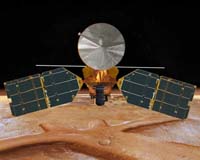 industry 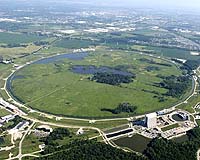 mars-water-science  |
 Paris, France (ESA) Dec 12, 2008
Paris, France (ESA) Dec 12, 2008The final four Europeans who are set to take part in a 105-day simulated Mars mission were presented to the media in Paris today. From March next year, two of the group will join four Russian participants inside an isolation facility in Moscow. A selection process which started with 5600 applicants has now been finalised with the presentation today of the final four participants at ESA's ... more HiRISE Camera Captures High-Resolution 3D Images Of Mars  Pasadena CA (SPX) Dec 09, 2008
Pasadena CA (SPX) Dec 09, 2008The High Resolution Science Imaging Experiment, or HiRISE, team based at The University of Arizona have released 362 three-dimensional images of Mars taken by the HiRISE camera on NASA's Mars Reconnaissance Orbiter. Other Mars-orbiting cameras have taken 3D views of Mars, but the HiRISE camera - the most powerful camera ever to orbit another planet - can resolve features as small as one me ... more China To Launch Probe To Mars With Russian Help In 2009  Beijing (RIA Novosti) Dec 08, 2008
Beijing (RIA Novosti) Dec 08, 2008China will send a space probe to Mars with Russia's assistance in October 2009, a Chinese newspaper said on Friday. Russia and China signed a cooperative agreement on the joint exploration of Mars on March 26, 2007. The project includes the launch of the Yinghuo-1 Chinese-made Mars probe. Yinghuo-1 and the Russian Phobos-Grunt probe will be sent together to Mars on a Russian Zenit ... more NASA lands a cosmic first with "tweets" from Mars  San Francisco (AFP) Dec 5, 2008
San Francisco (AFP) Dec 5, 2008If the Phoenix Lander comes back to life on Mars, Twitter users could be among the first to know. NASA gave the historic Space Age mission an Internet Age spin by adding a Twitter page, enabling the robotic interplanetary explorer to answer the hot micro-blogging website's trademark query: "What are you doing?" Twitter rocketed to popularity with technology that lets people use mobile ... more |
mars-base
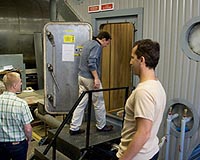 mars-lab 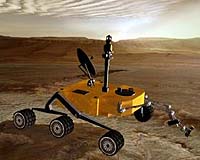 mars-general 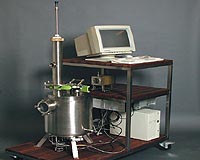 |
 Washington (AFP) Dec 4, 2008
Washington (AFP) Dec 4, 2008US space agency NASA delayed a landmark mission to Mars by 26 months on Thursday, adding another 400 million dollars to the already over-budget project to see if the red planet can support life, officials said. "We will not be ready to launch Mars Science Lab by the hoped-for date next year," NASA administrator Michael Griffin told a news conference. A 2009 launch was ruled because it "would ... more Ancient Climate Cycles Recorded In Mars Rocks  Pasadena CA (SPX) Dec 05, 2008
Pasadena CA (SPX) Dec 05, 2008Researchers at the California Institute of Technology (Caltech) and their colleagues have found evidence of ancient climate change on Mars caused by regular variation in the planet's tilt, or obliquity. On Earth, similar "astronomical forcing" of climate drives ice-age cycles. Using stereo topographic maps obtained by processing data from the high-resolution camera onboard NASA's Mars ... more NASA Finishes Listening For Phoenix Mars Lander  Pasadena CA (SPX) Dec 03, 2008
Pasadena CA (SPX) Dec 03, 2008After nearly a month of daily checks to determine whether Martian NASA's Phoenix Mars Lander would be able to communicate again, the agency has stopped using its Mars orbiters to hail the lander and listen for its beep. As expected, reduced daily sunshine eventually left the solar-powered Phoenix craft without enough energy to keep its batteries charged. The final communication from ... more Spirit Drained As Martian Dust Storms Continue  Pasadena CA (JPL) Dec 02, 2008
Pasadena CA (JPL) Dec 02, 2008Spirit's condition has improved during the past week, though skies remain fairly dusty after the recent Martian dust storm. Since sol 1730 (Nov. 14, 2008), solar-array energy has averaged 169 watt-hours (100 watt-hours is the amount of energy needed to light a 100-watt bulb for 1 hour). The latest measurement of atmospheric darkness caused by dust, known as Tau, is 0.858. The dust factor, repres ... more
|
mars-mers
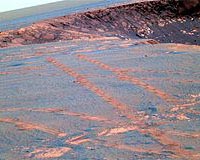 asteroid 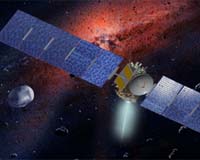 mars-general  |
| Previous Issues | Dec 27 | Dec 26 | Dec 23 | Dec 22 |
| The contents herein, unless otherwise known to be public domain, are Copyright 1995-2007 - SpaceDaily. AFP and UPI Wire Stories are copyright Agence France-Presse and United Press International. ESA Portal Reports are copyright European Space Agency. All NASA sourced material is public domain. Additional copyrights may apply in whole or part to other bona fide parties. Advertising does not imply endorsement, agreement or approval of any opinions, statements or information provided by SpaceDaily on any web page published or hosted by SpaceDaily. Privacy statement |